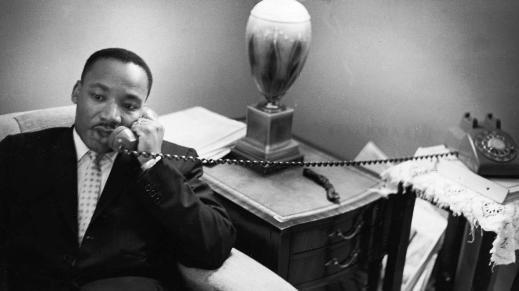Time profiles a woman fighting for her husband to get parole, against the background of unequal sentencing of African Americans, while MLK/FBI tells of J. Edgar Hoover’s campaign to destroy Dr. Martin Luther King.
Two documentaries, one personal, one historical, about the African American quest for justice.
 Time, a film by Garrett Bradley, examines the reality of incarceration in the United States through the story of one family. In 1997, Robert Rich and his wife Fox robbed a credit union in Louisiana. Fox took a plea deal for twelve years and served five. Robert refused his and was sentenced to sixty years without parole. The fact that they were guilty of the crime actually makes the film more relevant. Statistically, black defendants receive harsher sentences than white ones, twenty percent more time for the same crime. This is the background of the Riches’ story. In the foreground is the unceasing struggle of Fox Rich to win parole for her husband. The title of the film, Time, not only refers to the length of a prison sentence, but that essential aspect of life that we lose when a loved one is incarcerated.
Time, a film by Garrett Bradley, examines the reality of incarceration in the United States through the story of one family. In 1997, Robert Rich and his wife Fox robbed a credit union in Louisiana. Fox took a plea deal for twelve years and served five. Robert refused his and was sentenced to sixty years without parole. The fact that they were guilty of the crime actually makes the film more relevant. Statistically, black defendants receive harsher sentences than white ones, twenty percent more time for the same crime. This is the background of the Riches’ story. In the foreground is the unceasing struggle of Fox Rich to win parole for her husband. The title of the film, Time, not only refers to the length of a prison sentence, but that essential aspect of life that we lose when a loved one is incarcerated.
Fox Rich shot black and white home videos of her life raising her six sons, and the director Bradley weaves this footage in between sequences of her current efforts to free the man she’s loved since she was 16—speaking at gatherings of prison families, calling court secretaries and clerks for status updates, and all the while building her own car dealership business and networking with the New Orleans business community.
The film is shot in black & white to harmonize with Fox Rich’s videos. As we watch these remarkable home movies, we see her kids growing up. Her youngest sons, twins, are three years old at the beginning of the film. By the time we see them in the present, they’ve turned 18, all without having their father at home. A particularly appealing character is Robert’s mom, who doesn’t forget to berate her daughter-in-law for the stupid thing she and her son did, but stands by and supports her nevertheless. The portrait that emerges of Fox Rich is of an indomitable force of love. This is not about complaining, but about her absolute dedication to the task. Along the way we are shown how injustice feels and the damage it does, and also how love can never be defeated.
MLK/FBI, directed by Sam Pollard, concisely reveals its subject with its title. We’ve known for decades that J. Edgar Hoover used his Federal Bureau of Investigation to spy on and harass Dr. Martin Luther King. But recently, declassified files were released through the Freedom of Information Act to Pulitzer-prize winning historian David Garrow that reveal how extensive the anti-King program was.
The film lays out how the FBI was glorified in American culture through movies and television, so that the Bureau was widely admired. In the heyday of the Civil Rights era, the FBI’s popularity polled at 50% while Dr. King was at 17%.

The movie also takes us through King’s career and gradual ascent to prominence. When Hoover found out that one of King’s white confidants was a former Communist, he was convinced that, in his own words, Martin Luther King was the most dangerous Negro in America. Hoover, who had a poor record of prosecuting organized crime, had been obsessed by communism since the 30s. He thought any means were justified in attacking those whom he thought were communists, and he had a sure grip on power in Washington. He had King’s home, his telephone, and every hotel room where he stayed on his travels, wiretapped. Recordings revealed that King had extramarital sexual encounters. Hoover tried to use that against King, but the press wouldn’t bite, so he sent one of the tapes to King’s wife Coretta. There was also an infamous anonymous letter sent by the FBI to Dr. King threatening to expose him and then advising him to kill himself.
MLK/FBI is required viewing, especially for those who have only been exposed to a sanitized version of King and the civil rights era that leaves out both the challenging and sometimes radical statements by Dr. King, and the relentless white supremacist attacks on him during his life. We owe it to ourselves to learn the truth about our history.

Chris Dashiell talks about his favorites among the films he saw in 2019. Thinking back on 2019, preparing to put together a list of...

A documentary portrait of Ruth Bader Ginsburg reveals the life story of the Supreme Court Justice and her key role in advancing women’s rights...

Steven Soderbergh’s return to the big screen is a comedy heist film with a southern blue collar flavor. Steven Soderbergh, one of our best...